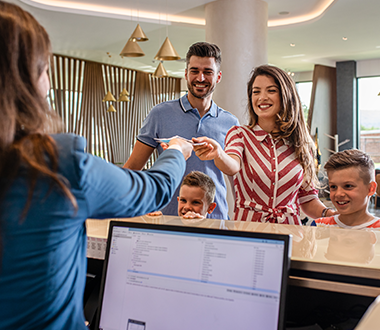Music as a Competitive Tool?
Have you noticed which songs or genres of music are playing in a restaurant, store, or shopping mall when you walk into it? The right music can have a positive impact on purchasing decisions, customer moods, store atmosphere, brand image and employee well-being. Let's look at this topic from two perspectives - the employee's and the customer's.
Studies show that...
Many companies around the world believe that the most productive and motivated workers are those who tend to work all day in a noise-free environment, without any distractions.
However, science has proven that employees are more productive and happier if they listen to music in the workplace. A study published in the journal Neuroscience and behavioral physiology suggested that playing rock or classical music allowed participants to identify numbers more accurately and quickly. Researchers from The University of Windsor noted that the overall quality of work of a team of software developers was at its lowest when there was no music in the workplace.

Regardless of the industry, music is proven to improve employee mood. When they listen to music they actually enjoy, a chemical known as dopamine is released in the brain, making them feel satisfied and happy. Popular motivators include movie soundtracks.
Other research suggests that ambient music might be the best genre for improving work productivity. A study conducted by Mindlab International Ltd claims that dance and pop music promotes work performance speed. For example, proofreaders complete their tasks up to 20% faster when listening to dance music.
Classical music is considered one of the most effective ways to help employees unwind and relax. Did you know that mathematicians are about 12% more accurate in solving problems when listening to classical music?
But of course, there's no denying that concentrating in a noisy office can be difficult, and some people may actually prefer a quiet environment.
What about the customer?
As with the impact on employees, we can rely on science. According to market research by an independent journal, music has a strong influence on customers' purchasing decisions. The research concluded that choosing the right music can increase sales, as the right selection allows customers to literally "hang out" in a relaxed and good mood. People don't just shop according to their budget, they shop according to their mood. If they are willing to
stay longer in your store (you have to give them a reason to do so), there is a better chance they won't leave empty-handed.
The speed of the music, its rhythm and volume is also key. Classical music tends to give consumers the impression of a higher quality. On the other hand, this can also have a negative effect, as this serious type of music can give the impression of higher prices.

A research found that once customers were served food to slow tempo music, they spent more time at the table (56 minutes) as opposed to those who listened to fast tempo music (45 minutes). Soothing music also proved to make customers more patient. When slow tempo music was playing in a restaurant, customers were willing to wait an average of 47 minutes, and if the music was not as soothing, wait times would have been 20% lower.
If you don't have any music playing in your establishment, your customers may feel uncomfortable and they may feel like their conversation is being overheard by diners at a nearby table. The sounds of cutlery and food in the restaurant will also not be a pleasant addition to the dining experience. So you'd better not risk it.
Don't forget to subscribe to our newsletter to get more tips and advice from different areas of the business world.



